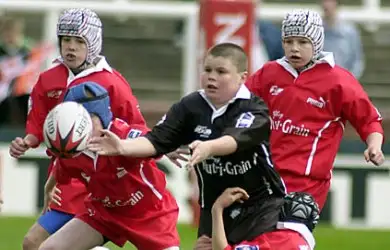Amateur summer switch makes sense

Imagine for a moment that you are nine years-old. It is currently the middle of December, and you play for a local junior rugby league club. Your team train on a tiny floodlit field every Tuesday and Thursday night, but the pitch is in continual use from other teams and has become very boggy.
The weather is cold, damp and there is a constant shower of rain and sleet. Your coach tries to keep the sessions fresh and interesting, but he cannot teach you the skills to develop because of the harsh weather conditions and the limited players available.
Are these suitable conditions to teach a child how to play rugby league? Would a parent like to stand in the cold for an hour while they watch their child slowly becomes disheartened is uninterested?
The call made for amateur clubs to switch their playing season from winter to summer is starting to carry some weight, and there are many reasons why teams affiliated with BARLA should make the switch.
While the original call is for teams at all age groups to make the switch, the teams in the lower age groups should be allowed to play in summer regardless of when the open age teams play their matches. A switch of junior clubs from winter to summer would see a significant increase in playing numbers. It would retain the children who also play both football and rugby league during the winter, as well as attract those who play football and would like the opportunity to play rugby league.
The switch would also benefit the young players who can train in better conditions, and therefore learn the skills of rugby league much quicker in a better environment. Ask any junior coach and they will say it is easier to coach kids during a summer evening when the weather is much cooler than during the day.
As a result of training in less harsher conditions, this will increase the potential talent pool of young players. This will benefit the England squad in the long term as players will have mastered the skills in a better environment compared to their winter counterparts. The quality and level of skill will improve in the Super League and Championship in years to come as the players being selected at under 16 will have played their entire careers in the summer, and won’t have to adapt from winter to summer in preparation for the under 18 academy competition.
Should the amateur clubs choose to continue playing their open age playing season in the summer, then the transition from summer to winter will happen immediately after under 18 and not to the benefit of the players should the junior teams make the switch. Therefore it may be beneficial for the youth teams to continue playing in winter. But playing numbers across the under 17-18 age group take a dive, and this may be partly down to the fact these players have just left high school.
Many players take on jobs and apprenticeships once they leave secondary school, while the rest go into further education. These young adults are capable of making their own decisions with regards to if they want to play rugby league, so the winter playing season may not be a greater factor as the players grow up. However, they are becoming young adults and are tempted by the lure of alcohol and going out with their friends on a Saturday night. Therefore it may be beneficial for these age groups to play on a Saturday afternoon parallel to that of the open age team.
This time is much more flexible socially and gives the players a chance to socialise with their team mates and non-rugby playing friends during the evening. As a result the player drop out would decrease significantly, and may attract new players who would like a social activity to participate in on a Saturday afternoon.
Whatever the outcome of the open age switch to summer rugby, whether it goes through or not, the junior and youth teams must consider a separate opportunity to change from their traditional winter Sunday morning kick off times. They must take into account their player’s other commitments and work with them to increase and retain playing numbers.